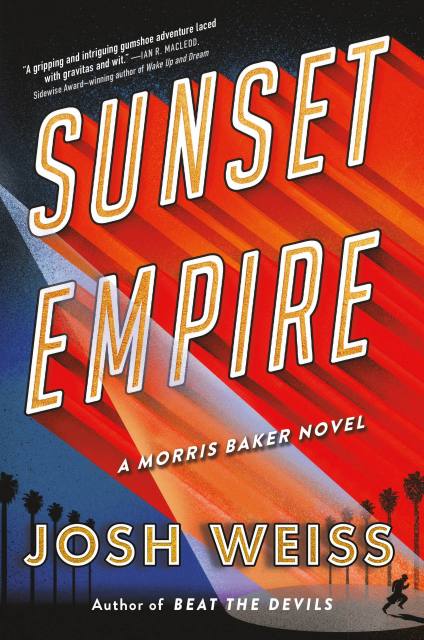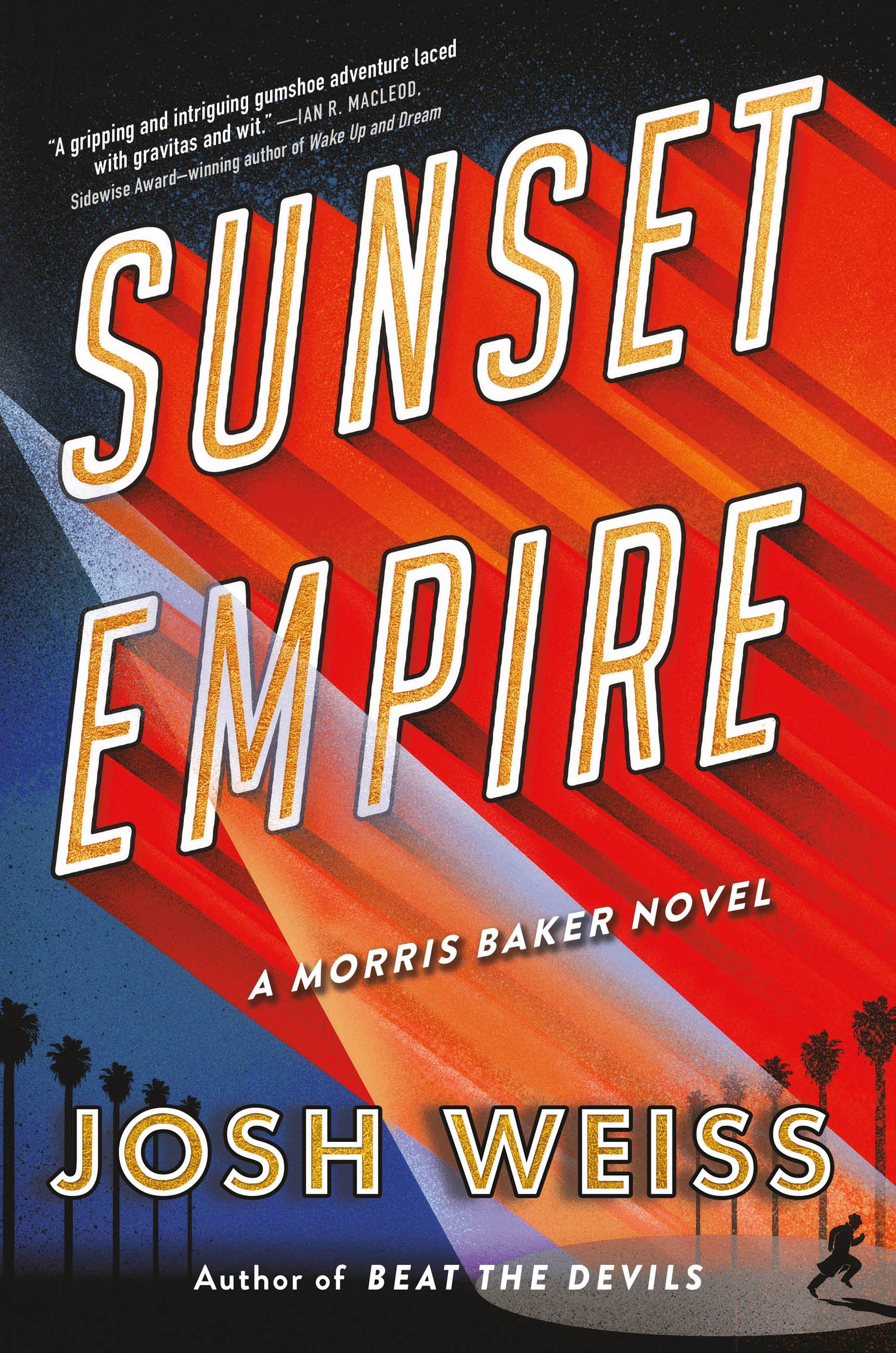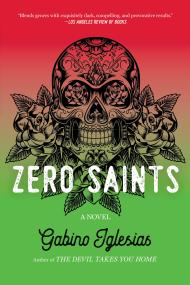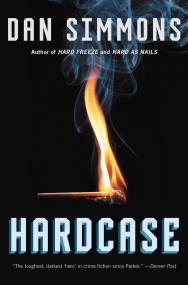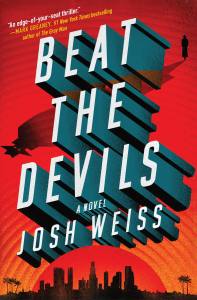Sunset Empire
Contributors
By Josh Weiss
Buy from Other Retailers:
- On Sale
- Mar 28, 2023
- Page Count
- 448 pages
- Publisher
- Grand Central Publishing
- ISBN-13
- 9781538719473
December, 1959: The Korean War rages on.
Protesting the bloody conflict, a Korean-American man by the name of William Yang suddenly blows himself up in the middle of a Los Angeles department store just before Christmas, which leads the U.S. government to reopen the internment camps used during World War II. President Joseph McCarthy’s America has never been more on edge, paranoid, and above all, dangerous.
Several weeks later, a woman hires Morris Baker, now working as a private investigator, to track down her missing husband — Henry Kissinger — who may have a shadowy connection to Yang’s purported terrorist attack. The ensuing investigation for the missing State Department consultant working for Vice President Richard Nixon sends Baker on another thrilling adventure of deceit, intrigue, sex, murder, and conspiracy where the safety of the entire world may hang in the balance.
-
"Another clever collision between history and what-might-have-been, but this time with the USA's misadventures in East Asia and Indochina swept into the geopolitical storm. A gripping and intriguing gumshoe adventure laced with gravitas and wit."Ian R MacLeod, Sidewise Award-winning author of Wake Up and Dream
-
"To my delight, this book surpassed Beat the Devils. Sunset Empire kept me guessing and I enjoyed all of the story’s twists and turns. If you love noir, crime stories, hard-nosed detectives, history, and alternate reality, then this book is for you. Although it’s a work of fiction, Sunset Empire is very prescient to what’s currently happening in the world. I’m ready for more Morris Baker stories!"Michael Kronenberg Artist, Graphic Designer Film Noir Foundation/NOIR CITY Magazine
-
“Bright, terrifying, alternate-fiction-that-could-be fact, detective Morris Baker returns full force to the scene of a brand-new crime. Pick up Sunset Empire, and you won’t put it down until the very last word.”Paul Lally, author of the Amerika and Rise Again trilogies
-
Josh’s writing is beautifully visual, with characters so perfectly realized, that his melding of real history and fiction takes on a poignancy that transcends the ‘What If?’ genre and makes you worry, ‘What If Again?’. I can’t wait for another Morris Baker case!Ben Parker, writer/director of Burial & The Chamber
-
“Clever… As a practicing Jew—and a guilt-ridden one to boot—Baker is a rarity in crime fiction."Kirkus Reviews
-
"In Weiss’s superb sequel... Imaginative worldbuilding enhances the page-turning mystery plot. Fans of Robert Harris’s Fatherland will be enthralled."Publishers Weekly, starred review
-
"The ending is so powerful one looks away from the page."Booklist
-
Praise for Beat the Devilsi>
-
"Reading Josh Weiss’s debut novel feels like riding shotgun with a friend who’s driving expertly through a winter storm... Weiss creates palpable emotional depth, particularly for Baker, whose yearslong tactic of burying trauma has stopped working."New York Times Book Review
-
"Beat The Devils by Josh Weiss blew me away. A brilliant alternate history, a riveting fifties-era noir crime caper, and an edge of your seat thriller—all wrapped into one! This is a stunning novel that takes readers for a mind-bending ride with elements that seem shockingly relevant in our current day and age."Mark Greaney #1 NYT Bestselling Author of The Gray Man
-
“Tight, well-paced, inventive, and inspirational, Weiss’ splendid debut is classic noir tinged with the slightest pinch of science fiction; readers can thrill to the bits of dissonant history they recognize, even as they revel in the mayhem and suspense that permeate the text.”Mystery Scene Magazine
-
“Josh Weiss has announced himself as a bold new voice in the world of pulp noir fiction. One part Raymond Chandler, one part Philip Roth, a dash of Ben Hecht — and you’re about halfway there.”J.D. Lifshitz, co-founder of BoulderLight Pictures and producer of The Vigil
-
"Alternate histories are difficult to craft, but the world of Beat the Devils is built with hair-raising perfection. Weiss holds a warped mirror to the American Dream — revealing dark undercurrents thread through with troubling, yet true, history. I couldn't turn the pages fast enough!"Ryan Graudin, award-winning author of Wolf by Wolf
Formats and Prices
Price
$28.00Price
$35.00 CADFormat
Format:
- Hardcover $28.00 $35.00 CAD
- ebook $13.99 $17.99 CAD
- Audiobook Download (Unabridged) $31.99
Praise
-
“Another clever collision between history and what-might-have-been, but this time with the USA’s misadventures in East Asia and Indochina swept into the geopolitical storm. A gripping and intriguing gumshoe adventure laced with gravitas and wit.”Ian R MacLeod, Sidewise Award-winning author of Wake Up and Dream
-
“To my delight, this book surpassed Beat the Devils. Sunset Empire kept me guessing and I enjoyed all of the story’s twists and turns. If you love noir, crime stories, hard-nosed detectives, history, and alternate reality, then this book is for you. Although it’s a work of fiction, Sunset Empire is very prescient to what’s currently happening in the world. I’m ready for more Morris Baker stories!”Michael Kronenberg Artist, Graphic Designer Film Noir Foundation/NOIR CITY Magazine
-
“Bright, terrifying, alternate-fiction-that-could-be fact, detective Morris Baker returns full force to the scene of a brand-new crime. Pick up Sunset Empire, and you won’t put it down until the very last word.”Paul Lally, author of the Amerika and Rise Again trilogies
-
Josh’s writing is beautifully visual, with characters so perfectly realized, that his melding of real history and fiction takes on a poignancy that transcends the ‘What If?’ genre and makes you worry, ‘What If Again?’. I can’t wait for another Morris Baker case!Ben Parker, writer/director of Burial & The Chamber
-
“Clever… As a practicing Jew—and a guilt-ridden one to boot—Baker is a rarity in crime fiction.”Kirkus Reviews
-
“In Weiss’s superb sequel… Imaginative worldbuilding enhances the page-turning mystery plot. Fans of Robert Harris’s Fatherland will be enthralled.”Publishers Weekly, starred review
-
“The ending is so powerful one looks away from the page.”Booklist
-
Praise for Beat the Devilsi>
-
“Reading Josh Weiss’s debut novel feels like riding shotgun with a friend who’s driving expertly through a winter storm… Weiss creates palpable emotional depth, particularly for Baker, whose yearslong tactic of burying trauma has stopped working.”New York Times Book Review
-
“Beat The Devils by Josh Weiss blew me away. A brilliant alternate history, a riveting fifties-era noir crime caper, and an edge of your seat thriller—all wrapped into one! This is a stunning novel that takes readers for a mind-bending ride with elements that seem shockingly relevant in our current day and age.”Mark Greaney #1 NYT Bestselling Author of The Gray Man
-
“Tight, well-paced, inventive, and inspirational, Weiss’ splendid debut is classic noir tinged with the slightest pinch of science fiction; readers can thrill to the bits of dissonant history they recognize, even as they revel in the mayhem and suspense that permeate the text.”Mystery Scene Magazine
-
“Josh Weiss has announced himself as a bold new voice in the world of pulp noir fiction. One part Raymond Chandler, one part Philip Roth, a dash of Ben Hecht — and you’re about halfway there.”J.D. Lifshitz, co-founder of BoulderLight Pictures and producer of The Vigil
-
“Alternate histories are difficult to craft, but the world of Beat the Devils is built with hair-raising perfection. Weiss holds a warped mirror to the American Dream — revealing dark undercurrents thread through with troubling, yet true, history. I couldn’t turn the pages fast enough!”Ryan Graudin, award-winning author of Wolf by Wolf
WHAT’S INSIDE
PROLOGUE
I will defend Korea as I would my own country—just as I would California.
—General Douglas MacArthur
We’re gonna nuke each other up, boys, ’til old Satan stands impressed.
—Matt Maltese
December 1, 1959
They called him “The Tiger” because of his ravenous devotion to the cause. He approved of the moniker, but not for the reasons they provided. He approved of the title because it reminded him of the bedtime stories his mother would often recite to him as a boy.
Korean fairy tales always began not with “Once upon a time . . . ” but with “Back when tigers smoked . . . ” Tigers did not smoke, of course. The traditional opening signified the start of a fantastical journey— one that could never take place in the real world.
The memory of his mother’s voice enveloped him, soft and comforting like a beloved childhood blanket.
His true name was . . . wait, what was his real name . . . ? William! Yes, William Yang. That’s right. How could he have forgotten? William Yang, a near-lifelong native of Los Angeles and a . . . wait, what did he do for a living? Where was he? A pleading, panicked voice that seemed to come out of nowhere screamed: “Wake up, William! Wake up!”
The Tiger shook his head. His mind was just a tad foggy, but that was to be expected with the momentous job sitting before him. A job that was mere moments away from being carried out.
Nothing else mattered, except the cause.
Soft Christmas music brought him back to the hustle and bustle of the department store. “Chestnuts roasting on an open fire . . . Jack Frost nipping at your nose . . . ” crooned Nat King Cole in a tender, fire-side tone. Men and women, accompanied by giggling children, cast murderous, side-eyed glances in his direction as they went about their early holiday shopping.
He was the enemy to them.
It made no difference that he’d been raised in this country—had spoken its language, observed its customs, and fought for its values. The shape of his eyes was reason enough in their minds to loathe him, to lump him in with those fighting a conflict an ocean away.
He walked freely among them, and yet he was not free. Not when his very rights as an American were under attack. Not when people who looked like him were ripped from their beds and taken away, never to be seen again. It was why he’d traveled across that vast ocean to his ancestral homeland, where he had found glorious enlightenment. Those few months spent on the training grounds just outside Pyongyang— Pyongyang? Do you hear yourself? You’ve never been to Pyongyang! Wake up!—had imbued him with a profound, unshakable sense of purpose. Meaning had finally emerged from the infinite void of chaos.
He plunged his hands into the deep pockets of his heavy overcoat, pretending to innocently browse a display of neckties. An uncharacteristic chill had recently settled over the city of Los Angeles, and as such, his winter wear would not appear out of place to any casual observer. Fortune had smiled upon him in the form of steely clouds and swirling mists.
Thumbing the hidden detonator within his pocket, The Tiger experienced a rush of excitement at the thought of plunging it down in just a few minutes’ time. The fifty pounds of plastic explosive strapped to his chest felt light as a feather.
The instructors in Pyongyang had taught him why it was necessary to strike before their culture was completely wiped from existence. And from there, the training began—from morning until night. What did that training entail exactly, William? What were the names of your instructors? Can you even remember? No, you can’t! Wake up!
He didn’t need to recall details of his training to grasp his ultimate purpose. All he knew was that they’d pushed him to his absolute limits and then farther still until there was no doubt of his loyalty to the cause. That he was indeed worthy of being called “The Tiger.”
And when it became clear that his yearning for action was insatiable, they chose him for a mission that would change everything. They taught him the rudimentary mechanics of homemade explosives and, when the time was right, smuggled him back into the United States to do what was necessary. Nothing else mattered, except the cause.
“They know that Santa’s on his way . . . bringing lots of toys and goodies on his sleigh . . .”
These people knew nothing of suffering; what it was like to have your homeland defiled by a viral interloper. How he hated them. They went about their pathetic little lives as if thousands of others weren’t being starved and slaughtered in their name. They bought suits and brassieres, draped holly and tinsel over Christmas trees, while their own soldiers razed towns, raped innocent women, and haphazardly dropped firebombs of skin-melting napalm. Children screaming, their flesh dripping like wax sculptures under heat lamps.
Every American was complicit in the sacking of Korea—a bloody conflict that refused to end for eight long years. A string of Pyrrhic victories eroding American morale and bolstering Korean resolve.
Through a refusal to yield, to acknowledge when they were licked, President McCarthy and General MacArthur had unintentionally unified most Koreans under the banner of Communism. The concept of North versus South no longer mattered. Bickering over economic ideologies became immaterial in the face of an invading force too stubborn to leave.
Still, The Tiger thought to himself, McCarthy isn’t as foolhardy as he once appeared. Despite the president’s constant threats of exercising “the nuclear option,” he had yet to provide the go-ahead—perhaps afraid of what dominoes he might knock over by eradicating a good chunk of East Asia. No, McCarthy was being sensible. But how long would that sense last? How high would the body toll need to rise until the president decided to play the most devastating ace in the deck?
If something wasn’t done to stem the flow soon, the poison of war, of bigotry—and yes, radiation—would bleed across the generations, perpetuating an endless cycle of death and violence. And not just in Korea, but in Indochina as well. Emboldened by America’s recalcitrance to yield to the inevitable, France continued its own unlawful occupation of Vietnam, Cambodia, and Laos. It mattered not how many soldiers were lost to the guerrilla fighters, who had nothing left to lose and everything to gain. Pride superseded bloodshed.
The United States was the illness, and The Tiger was the fever that would bring clarity once it broke. He would be the guiding light, the great liberator, the only person gifted with sight in a world that would rather gouge out its own eyes than see things for what they were. They would throw parades in his honor all over the homeland—from Pyongyang to Busan.
“Tiny tots with their eyes all aglow . . . will find it hard to sleep tonight . . .”
A young boy and girl suddenly emerged from a rack of maroon dinner jackets, playing a harmless game of tag. Staring after them, The Tiger was reminded of his youth. He had once played a similar game with a girl called Evelyn, but for some reason, he could not ascribe meaning to the name. Who was she? Yet again, the strange voice resurfaced inside his head: “Please, William! This isn’t you! You need to snap out of it before you do something you regret! You need to call Evelyn! Tell her everything! It’s not too late!”
Tears that didn’t feel like his own raced down his cheeks. He felt strangely torn and almost gave in to the faint voice, almost took his finger off the hidden trigger and walked away. Almost. The hesitation was painful and tiring, like trying to swim against a raging tide in the middle of a storm.
And now there was a second voice—one wholly disconnected from his own. “Go ahead, William,” it said, cutting through his brain tissue with the ease of a white-hot kitchen knife. “Do what we trained you to do. You will be doing your homeland a great service, ja? These people are the enemy, remember? Go ahead . . . Do it . . . Do it . . . Do it . . . ”
Szell . . . Szell . . . Szell . . . went his mind in monotonous, meaningless repetition. Instinctive word association turned it into a pun on capitalism: Buy . . . Buy . . . Buy . . .
“It’s a lie!” bleated that other William Yang. “You’re an American, William! You of all people know what this will do to Evelyn, to our parents, to all our friends! Everyone that looks like us! For fuck’s sake, WAKE UP!”
“Enough of this,” The Tiger muttered, unaware that he was cradling his pounding head in his hands. Slowly, he walked to the middle of the crowded showroom, spreading his arms out wide. The anguished version of William weeping inside his head belted one last futile scream—“NOOO!”—while that other voice happily exclaimed in a language he did not speak.
“DEATH TO AMERICA! LONG LIVE KOREA!” The Tiger boomed. He beheld a sea of confused faces before depressing a thumb down on the bomb’s detonator.
Twenty-six people, including twelve children, were blown to pieces in an instant.
“Although it’s been said many times, many ways . . . Merry Christmas to youuuu . . .”
AND DON’T MISS THE FIRST MORRIS BAKER NOVEL!
USA, 1958. President Joseph McCarthy sits in the White House, elected on a wave of populist xenophobia and barely‑concealed anti‑Semitism. The country is in the firm grip of McCarthy’s Hueys, a secret police force evolved from the House Un-American Activities Committee. Hollywood’s sparkling vision of the American dream has been suppressed; its remaining talents forced to turn out endless anti‑communist propaganda.
LAPD detective Morris Baker—a Holocaust survivor who drowns his fractured memories of the unspeakable in schnapps and work—is called to the scene of a horrific double‑homicide. The victims are John Huston, a once‑promising but now forgotten film director, and an up‑and‑coming young journalist named Walter Cronkite. Clutched in the hand of one of the dead men is a cryptic note containing the phrase “beat the devils” followed by a single name: Baker. Did the two men die in an attack fueled by better-dead-than-red sentiment, as the Hueys are quick to conclude, or were they murdered in a cover-up designed to protect—or even set in motion—a secret plot connected to Baker’s past?
In a country where terror grows stronger by the day, and paranoia rises unchecked, Baker is determined to find justice for two men who raised their voices in a time when free speech comes at the ultimate cost. In the course of his investigation, Baker stumbles into a conspiracy that reaches deep into the halls of power and uncovers a secret that could destroy the City of Angels—and the American ideal itself.
